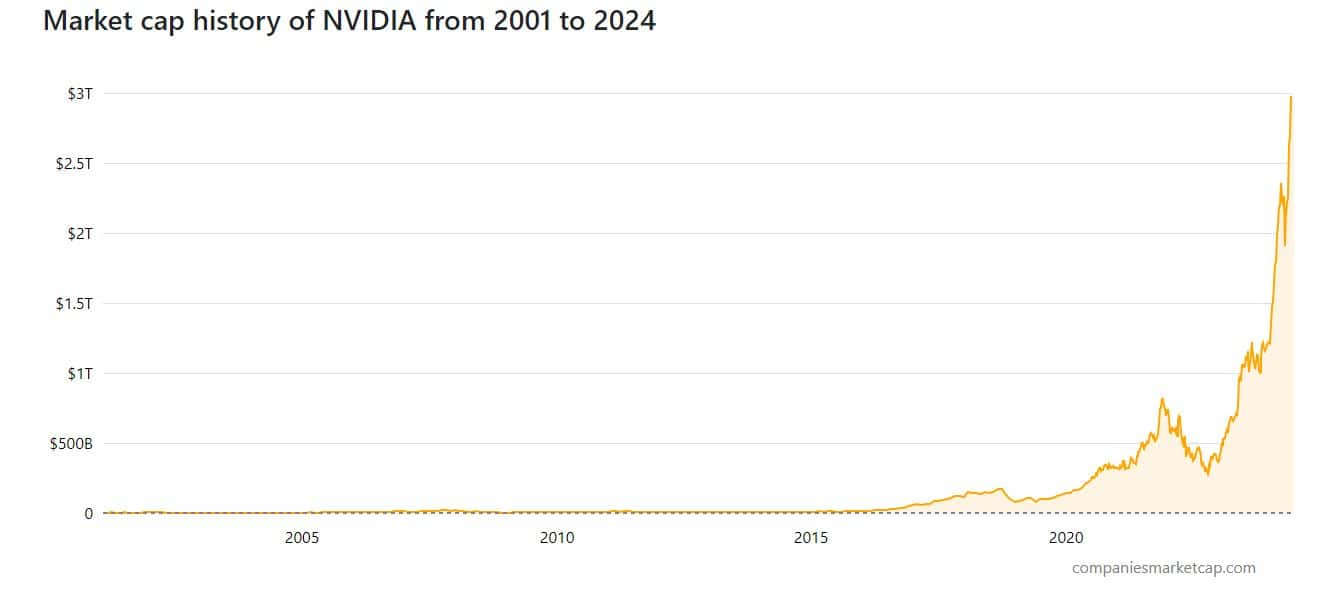



NVIDIA's ascent to dominance in the artificial intelligence (AI) chip race can be described as being in the right place at the right time.
Its market cap has surged to over $2.97 trillion, surpassing Google parent Alphabet and making it the third most valuable company globally, trailing only Microsoft and Apple.
The artificial intelligence (AI) industry has fueled demand for the hardware that powers AI applications: graphics processing units (GPUs).
From video games to AIToday, Nvidia is one of the GPU market leaders, but this wasn't always the case. Founded in 1993, NVIDIA was primarily known by PC gamers.
In recent times, however, it became clear that the GPU's ability to simultaneously process tasks could be useful in other industries. To achieve this, Nvidia created the parallel computing platform CUDA (Compute Unified Device Architecture) and what followed was an expansion into many areas, including AI.
Why are these GPUs necessary for AI?Originally designed for rendering computer graphics in video games, GPUs were later discovered to be well-suited for the computations required in AI.
These powerful processors enable AI algorithms to train on massive amounts of text and image data. As a result, these algorithms can then perform tasks like generating images or writing novels.
Nvidia's chips are the industry standard for large language models (LLMs). Specifically, Nvidia's A100 GPUs are used to train the model behind ChatGPT.
Tesla recently announced that it currently has 35,000 of NVIDIA's H100 GPUs and may deploy an additional 50,000 chips by the end of the year to train its AI models.
What do the numbers say?Nvidia's market cap didn't even reach $100 billion dollars until 2017, and it was less than a year ago that it first surpassed the $1 trillion valuation milestone. Nvidia joined the $2 trillion club this March, and it needed only 66 trading days to move from there to $3 trillion, according to Dow Jones Market Data.

Nvidia's revenue in the first quarter fiscal 2025 skyrocketed by 262 percent compared to the previous year, reaching $26.04 billion, surpassing the expected $24.65 billion. Sales in its data center segment, the largest revenue contributor, surged by 427 percent to $22.6 billion, beating estimates of $21.32 billion.
Additionally, Nvidia's forecast for the fiscal second quarter predicts revenue of $28 billion, exceeding analysts' expectations of $26.66 billion.
What are the hurdles?Despite its recent success, NVIDIA grapples with challenges in its supply chain. It heavily relies on Taiwan Semiconductor Manufacturing Co. (TSMC) for chip manufacturing, which exposes it to geopolitical risks.
While TSMC's planned Arizona chip plants offer some relief, reports suggest these chips will still require assembly in Taiwan.
As a fabless company, Nvidia outsources the chip manufacturing process entirely.
What about rivals?NVIDIA faces competition from established players like Intel, AMD, Meta, and Google, as well as emerging AI chip startups like Cerebras, Groq, and Tenstorren.
The increasing demand for AI hardware, driven by advancements in generative AI and the rising complexity of AI models, is intensifying the competition.
Late last year, AMD launched its MI300 accelerator, directly challenging Nvidia's data center accelerators. Meanwhile, Intel is expanding its Gaudi3 AI accelerator, positioning it as another contender against Nvidia's offerings.
Major cloud service providers like Microsoft, Google, and Amazon are increasingly investing in their own custom chips, known as ASICs (application-specific integrated circuits), designed to their specific AI requirements.
Last year, Microsoft unveiled its Maia 100 AI chip as an alternative to Nvidia's widely used GPUs.
In Q4 2023, NVIDIA owned 80 percent of the GPU market share but it is slowly starting to lose share to Intel and AMD.

Discover the latest Business News, Sensex, and Nifty updates. Obtain Personal Finance insights, tax queries, and expert opinions on Moneycontrol or download the Moneycontrol App to stay updated!
Find the best of Al News in one place, specially curated for you every weekend.
Stay on top of the latest tech trends and biggest startup news.